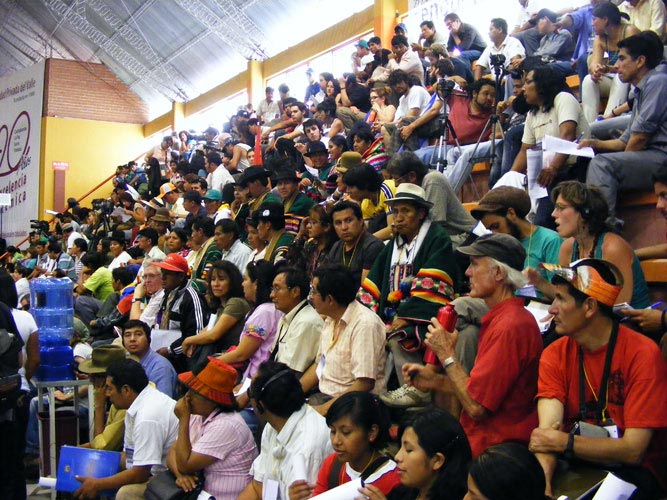Sep 18
20140
350.org / 1Sky, Non-Profit Industrial Complex, Whiteness & Aversive Racism
350.org Alliance of Small Island States Bolivia Friends of the Earth G77 Greenpeace Indigenous TckTckTck United Nations
350: Agent Saboteur
September 18, 2014
Knowledgeable people and authentic activists that are going to the “People’s” Climate March must re-ignite the “People’s Agreement” (Cochabamba, Bolivia, 2010), reject 350’s corporate agenda, and step aside for the Indigenous nations to resume their proven leadership in protecting Mother Earth.
Participants sit in bleachers at the packed World People’s Summit on Climate Change and Mother Earth’s Rights, Photo by The City Project
The World People’s Conference on Climate Change and the Rights of Mother Earth that took place in April of 2010 in Cochabamba, Bolivia, was the first and only climate conference that 1) was led by Indigenous Peoples (approx. 35,000 people attended), 2) was hosted by a state with an Indigenous President (Bolivia’s first Indigenous President) 3) was presented by a state with a very strong position on climate change (still to this date, the state that holds the strongest position in the world), and 4) produced the first democratically written document by its members as an answer to climate change – later to be submitted and recognized by the United Nations (due to the State of Bolivia representatives, no thanks to climate justice groups.) The resulting declaration, the People’s Agreement that resulted from this conference, would come to represent the only climate declaration ever written that could serve as an ideological and scientific foundation to build upon; that could have possibly (and realistically) averted, or at least mitigated, advancing climate crisis and ecological collapse – if only it had been acted upon at that time.
It was during this conference that American 350.org co-founder, Kelly Blynn, had a tantrum. The People’s Agreement was calling for a maximum of 300 parts per million of carbon dioxide. When pressed (by the former Green Party Canada leader and activist, Joan Russow, and myself) to consider the necessity of changing the 350.org logo (by crossing it out with an x and placing the new number/logo “300” beside it), an irritated Blynn stated that she and her co-founders would never agree to do so as 350.org was “the most powerful brand in the world.” (For the moment, let’s ignore the fact that “the most powerful brand in the world” aside, 350 ppm is a death sentence for coral reefs, small island developing states, and billions of people living along low lying coastlines. A fact disclosed in an Alliance of Small Island States Briefing prior to COP15.)
Whiteness & Aversive Racism
In the ultimate display of arrogance, it was clearly demonstrated that 350.org’s sole purpose for attending the conference in Bolivia was to literally undermine the host country’s official policy position on climate change (300 ppm, 1ºC limit, etc.). After exhausting all resources to have the “brand” (numeral 350) adopted as the official target cited in the evolving text of the draft document (350 ppm rather than 300 ppm), their efforts were finally defeated after both Russow and I challenged the 350.org colonial superiority at that evening’s plenary, which was packed with Bolivian citizens. Ultimately, the pre-industrial measurement of 280 ppm was rightfully added to the document. [1]
Ironically, the Bolivian-hosted conference was created in direct response to the December 2009 United Nations Climate Change Conference (COP 15 or “Hopenhagen”) in Copenhagen, Denmark, where Avaaz and 350.org, under the umbrella of TckTckTck (a campaign created by Havas advertising agency), undermined the necessary targets and radical emission reductions courageously put forward by the some of the Earth’s most vulnerable states. The Copenhagen conference’s proposed climate goal was a full one degree Celsius higher than the one put forth by the State of Bolivia, thereby knowingly sentencing these populations to certain death in order to maintain white Euro-American privilege. [The Most Important COP Briefing That No One Ever Heard | Truth, Lies, Racism & Omnicide]
While the State of Bolivia demanded that a 1ºC temperature increase not be exceeded, and the G77 called for severe, radical and necessary emission cuts, the non-profit industrial complex (NPIC), including most “climate justice” groups called for double this: the target of a full 2ºC temperature increase. A few of the more legitimate groups barely mustered the valour to “demand” the world not exceed 1.5ºC. One may wish to note that over 20 years ago, both Greenpeace and Friends of the Earth fully recognized the global average temperature increase must not exceed 1ºC (as clearly evidenced in documents). Yet at COP15, two decades later with climate change advancing rapidly, both groups under the TckTckTck umbrella participated in the 2ºC lie and the manipulation of civil society.
[1] “Developed countries shall take the lead and strive towards returning greenhouse gas concentrations in the atmosphere to well below 300 ppm CO2eq with a view to returning concentrations to levels as close as possible to pre-industrial levels in the longer-term, and to limit the average global temperatures to a maximum level of 1ºC with a view to returning temperatures to levels as close as possible to pre-industrial levels in the longer-term, with deep and adequate economy wide emissions reductions in the medium and long terms and taking effective measures to fulfill their commitments relating to the provision of substantial financial resources, capacity building and to provide technology
development and transfer of environmentally sound technologies and know how to developing country Parties. These enabling means are critical and an important measure to enhance the contribution and voluntary efforts of developing country Parties to the efforts of stabilizing of greenhouse gas concentrations in the atmosphere.”









